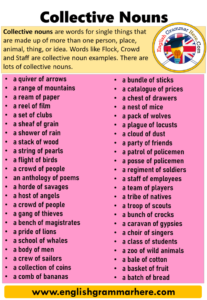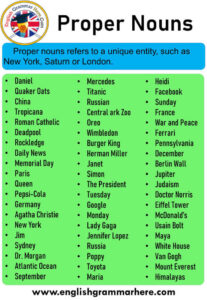คํานาม (Nouns)
คำนาม (Nouns) คือ คําที่ใช้เรียกคน สัตว์สิ่งของ และ สถานที่ เช่น man, jaguar, radio, hospital, conflict เป็นต้น
ประเภทของคํานาม
คํานามแบ่งออกเป็นพวกใหญ่ ๆ คือ

- คํานามทั่วไป (Common Nouns) หรือ สามานยนาม ได้แก่ คํานามที่ใช้เรียกสิ่ง ต่าง ๆ ทั่ว ๆ ไป เช่น girl, tennis, education, history, personnel
- I like your suggestion.
- He plays golf everyday.
2. คํานามเฉพาะ (Proper Nouns) หรือ วิสามานยนาม ได้แก่ คํานามที่เป็นชื่อ เฉพาะของคน สัตว์ สิ่งของ และจะต้องขึ้นต้นด้วยอักษรตัวใหญ่เสมอ เช่น Thailand, London Bridge, Ramkhamhaeng University, Dr. Gray Smith
- Anan studies in Japan.
- Bangkok is the capital of Thailand.

- a bunch of flowers a school of fish.
- The army marched around the Victory Monument.
- A flock of sheep is running into the village.
4. คํานามผสม (Compound Nouns) คือ คํานามที่ประกอบด้วยคํานาม 2 คําขึ้น ไปมารวมกัน ซึ่งอาจจะ
-
- เขียนติดเป็นคําเดียวกัน เช่น blackboard teacup lifeboat handbook countryman bystander.
- เขียนห่างกันเป็นสองคํา เช่น science fiction reference section behavior change blood vessels leisure hour government school.
- มีเครื่องหมาย เช่น passer-by tug-of-war commander-chief drive-activity court-material brother-in-law.
- Teachers should use the blackboard wisely.
- Students should regularly go over his notes in his notebooks.
5. คํานามรูปธรรม (Concrete Nouns) คือ คํานามที่หมายถึงสิ่งที่มองเห็นและ สัมผัสได้ด้วยประสาททั้งห้า เช่น animal, water, flower, typist
6. คํานามนามธรรม (Abstract Nouns) คือ คํานามที่ไม่มีรูปร่าง สัมผัสไม่ได้ แต่จะ กล่าวถึงความรู้สึก ความคิด ทัศนคติ และเหตุการณ์ เช่น effort, mankind, love, calmness, conflict
- Honesty is the best policy.
- Death comes to all men.
หน้าที่ของคํานาม (Functions of Nouns)
- ทําหน้าที่เป็นประธานของประโยค (Subject) เช่น Tom likes to travel.
- ทําหน้าที่เป็นกรรมตรง (Direct Object) เช่น They eat shark fins. The students should obey their teachers.
- ทําหน้าที่เป็นกรรมรอง (Indirect Object) เช่น The secretary of a society gave the members some brochures.
- ทําหน้าที่เป็นกรรมของบุพบท (Object of Preposition) เช่น We have waited for the famous actor long time.
- ทําหน้าที่เป็นส่วนที่ทําให้ประโยคสมบูรณ์ (Subject Complement) เช่น Barbara was a doctor three years ago.
- ทําหน้าที่เป็นคําขยายคํานามที่อยู่ข้างหน้า (Appositive) เช่น White, my manager, lives near the public park.
การเปลี่ยนรูปคำนามเป็นพหูพจน์
คํานามเปลี่ยนรูปคำนามจากเอกพจน์เป็นพหูพจน์
- คํานามส่วนใหญ่ทําเป็นพหูพจน์ ได้ ด้วยการเติม -s หรือ -es เช่น song – songs, bus – buses, fox – foxe, month – months, tomato – tomatoes, kiss – kisses.
- คํานามบางคําเมื่อเป็นพหูพจน์จะเปลี่ยนรูปไป เช่น man – men, child – children, foot – feet, mouse – mice, louse – lice, die – dice.
- คํานามบางคํารูปเอกพจน์และพหูพจน์เหมือนกัน เช่น fish – fish, species – specie, series – series, Japanese – Japanese, Swiss – Swiss.
- คํานามที่มีรูปเอกพจน์ แต่ใช้แบบพหูพจน์ เช่น people, cattle, poultry, police, majority
- คํานามที่มีรูปพหูพจน์ แต่ใช้แบบเอกพจน์ เช่น gentry, physics, statistics, mumps, economics, headquarters, mathematics, series, politics, savings, belongings.
- คํานามที่ใช้ในรูปพหูพจน์เสมอ เช่น tongs, trousers, scissors, pants, shorts, stairs.
- คํานามที่มาจากภาษาอื่น เช่น appendix – appendixes / appendices, agendum – agenda, curriculum – curricula, criterion – criteria, hypothesis – hypotheses phenomenon – phenomena, deer – deer, swine – swine, trout – trout, analysis – analyses cactus – cacti/cactuses, datum – data,formula – formulas, medium – media , thesis – theses.






